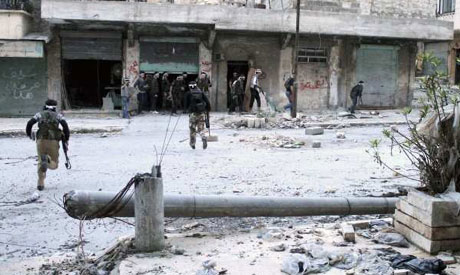
Free Syrian Army fighters runs to take cover during clashes with forces loyal to Syria's President Bashar al-Assadin Aleppo's Salaheddine district, April 30, 2013 (Photo: Reuters)
Matthew Hollingworth, the head of the World Food Programme's Syria operation said in an interview last week that WFP is trying to feed 2.5 million people every month inside Syria - a tenth of the population - and a million outside, in a conflict that has left 70,000 dead. He says his organisation will need to almost double the number of people it reaches by the end of the year.
"It's no secret that the conflict is intensifying, or has been intensifying over the last month," said the WFP's deputy regional emergency coordinator. "The two parties of the conflict are digging in." "We are trying to keep up with the enormity of the crisis and the impact of the brutality," he said.
Syria's once-peaceful uprising against four decades of family rule turned violent after President Bashar al-Assad's forces killed and arrested thousands, turning civil unrest into armed conflict. Now huge swathes of the country are effectively lawless and independent armed groups on both sides have emerged, creating access and security issues for humanitarian groups.
"The way the country and the map is drawn these days, it's not as simple as to say you're moving from government-held territory into opposition-held territory," said Hollingworth. "You may have to cross three or four different front lines to get access ... We run this gauntlet on a weekly basis, on a daily basis," he said, adding that WFP's weekly budget for the crisis was around $19 million.
International powers are increasingly concerned about the growing presence of hardline Islamist brigades and foreign jihadis who are flocking to Syria, and Hollingworth said that rebel ranks have grown increasingly disparate, bringing uncertainty to aid workers, who have to negotiate face to face as they travel around the vast country.
"What you see when you get out into the field is many different...brigades" he said. "They have a looser chain of command with the (western-backed) Free Syrian Army than perhaps we had seen six months ago."
Aid workers have been targeted during the war by both sides. Several volunteers for the Syrian Arab Red Crescent, a Red Cross partner, have been jailed or killed and the United Nations says aid convoys have been shot at.
Government forces appear to have made gains across Syria in recent weeks, even in northern provinces where rebels seized territory last year. They have also advanced around Damascus and the border with Lebanon, in areas that help link the capital to coastal provinces dominated by Assad's Alawite minority.
Rebels, mostly from the Sunni Muslim majority, hold chunks of southern, eastern and northern Syria. While the government says the military campaign against the rebels is succeeding, aid workers in Aleppo say the area of the country's biggest city that is now controlled by the government is very small.
The toll on Syrians is huge, Hollingworth says, with some internally displaced people having to move two or three times to escape growing violence. Food is so scarce for those uprooted by the fighting that rations intended to feed a family of five are being shared by three families.
Some host families are looking after five times the number of people that would normally live in their home, he added. "What happens is, the more times they're displaced, the more vulnerable they become. Their resources dwindle over time."
"You'll find 10, 15, 20 people living in one room. They come from, in some cases, pretty diverse backgrounds. But they live together and they support each other," he said.
Hollingworth worries that Syria's youth have become "deadened" to the violence and fears the conflict "will go on for a couple of generations."
UNICEF regional coordinator Youssef Abdul-Jalil estimated that three million children inside Syria now needed humanitarian assistance: "They are paying a terrible price in their lives, in their surroundings, in their health, in their education and in their lack of protection".
"We need a political solution for this conflict," said Marc Lucet, the local emergency coordinator for UNICEF, whose fellow humanitarian workers recount grim tales of hungry refugees found cowering in half-built apartment blocks or idle factories.
Stressing his point Lucet said: "The solution is certainly not to give more weapons to either side."
Short link: